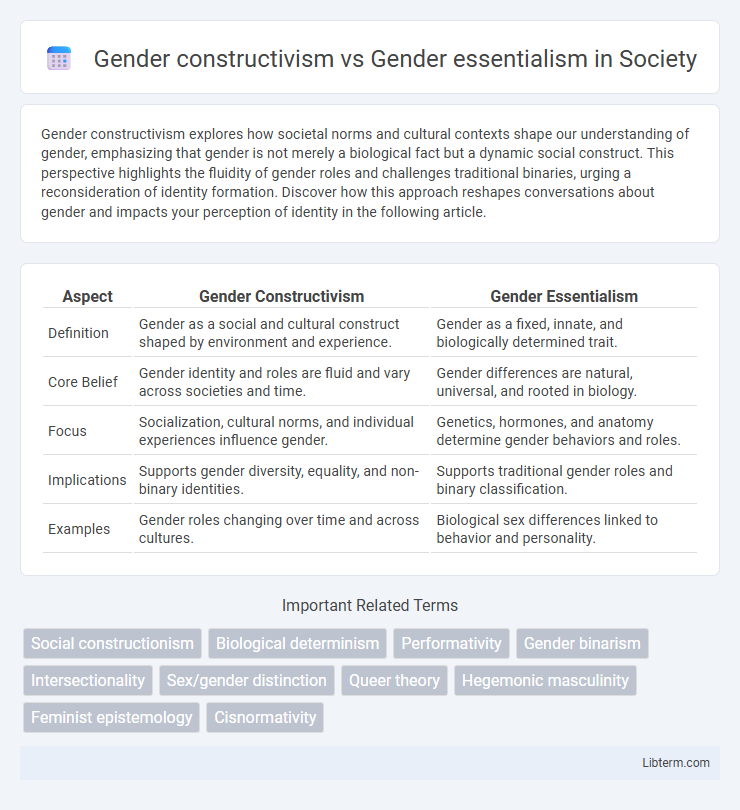Gender constructivism explores how societal norms and cultural contexts shape our understanding of gender, emphasizing that gender is not merely a biological fact but a dynamic social construct. This perspective highlights the fluidity of gender roles and challenges traditional binaries, urging a reconsideration of identity formation. Discover how this approach reshapes conversations about gender and impacts your perception of identity in the following article.
Table of Comparison
| Aspect | Gender Constructivism | Gender Essentialism |
|---|---|---|
| Definition | Gender as a social and cultural construct shaped by environment and experience. | Gender as a fixed, innate, and biologically determined trait. |
| Core Belief | Gender identity and roles are fluid and vary across societies and time. | Gender differences are natural, universal, and rooted in biology. |
| Focus | Socialization, cultural norms, and individual experiences influence gender. | Genetics, hormones, and anatomy determine gender behaviors and roles. |
| Implications | Supports gender diversity, equality, and non-binary identities. | Supports traditional gender roles and binary classification. |
| Examples | Gender roles changing over time and across cultures. | Biological sex differences linked to behavior and personality. |
Introduction to Gender Theories
Gender constructivism argues that gender identity and roles are socially constructed and fluid, shaped by cultural, historical, and interpersonal factors. Gender essentialism, in contrast, posits that gender differences are biologically innate and fixed, often linked to genetic or hormonal determinants. These foundational theories critically influence contemporary discussions in sociology, psychology, and feminist studies by framing gender as either a product of social context or a natural, immutable characteristic.
Defining Gender Constructivism
Gender constructivism asserts that gender identities and roles are socially constructed through cultural norms, language, and interactions rather than biologically predetermined traits. This perspective highlights the fluidity and variability of gender across different societies and historical periods. It contrasts with gender essentialism, which claims gender characteristics are innate, fixed, and rooted in biology.
Understanding Gender Essentialism
Gender essentialism posits that gender differences are innate, biologically determined, and immutable, emphasizing fixed traits linked to male and female identities. This perspective shapes societal norms by reinforcing the idea that gender roles and behaviors stem from natural predispositions rather than cultural or social influences. Understanding gender essentialism is crucial for analyzing how these entrenched beliefs impact policies, interpersonal relationships, and the recognition of gender diversity.
Historical Evolution of Gender Concepts
Gender constructivism emerged prominently during the late 20th century, challenging traditional views by emphasizing that gender roles are socially constructed and vary across cultures and history. In contrast, gender essentialism, rooted in earlier biological determinism theories, asserts that gender traits are innate, fixed, and universally applicable based on biological sex. The historical evolution of gender concepts reflects a dynamic shift from rigid, essentialist interpretations to more fluid, constructivist understandings influenced by feminist theory, sociology, and cultural studies.
Key Philosophers and Influencers
Judith Butler is a central figure in gender constructivism, arguing that gender is performative and shaped by social norms rather than fixed traits. In contrast, essentialists like Simone de Beauvoir emphasize inherent biological differences as foundational to gender identity, famously stating "One is not born, but rather becomes, a woman." Influential thinkers such as Michel Foucault explore how power relations and societal institutions produce and regulate gender categories, bridging constructivist perspectives with historical analysis.
Core Arguments of Gender Constructivism
Gender constructivism argues that gender identities and roles are socially constructed rather than biologically predetermined, emphasizing the influence of culture, language, and socialization processes. It posits that gender norms vary across different societies and historical periods, highlighting the fluidity and performative nature of gender. Central to this perspective is the belief that challenging and reshaping societal expectations can lead to greater gender equality and individual freedom.
Core Arguments of Gender Essentialism
Gender essentialism asserts that inherent, biological differences between males and females determine distinct gender roles and behaviors, rooted in genetics and physiology. It emphasizes that these innate traits are universal, stable, and dictate psychological and social characteristics, thus explaining gender disparities across cultures. Key proponents argue that such essential differences are immutable and foundational to identity, contrasting with perspectives that view gender as socially constructed or fluid.
Impacts on Society and Culture
Gender constructivism influences society by promoting fluidity in gender roles, leading to increased acceptance of diverse identities and challenging traditional norms in culture and institutions. Gender essentialism reinforces fixed, biologically-based roles, often perpetuating stereotypes and limiting social mobility and equality. These contrasting perspectives shape policies, education, and media representation, affecting social cohesion and cultural evolution worldwide.
Contemporary Debates and Criticisms
Contemporary debates on gender constructivism emphasize the social and cultural shaping of gender identities, challenging the fixed, biologically determined traits proposed by gender essentialism. Criticisms of gender essentialism highlight its potential to reinforce stereotypes and marginalize non-binary and transgender experiences, while gender constructivism faces scrutiny over its perceived relativism and neglect of biological influences. The intersection of these perspectives continues to shape discourse in gender studies, influencing policies, education, and identity politics worldwide.
Future Directions in Gender Theory
Future directions in gender theory emphasize integrating insights from gender constructivism with neuroscientific findings to challenge rigid gender essentialism. Emerging research prioritizes fluidity and intersectionality, exploring how social, cultural, and biological factors dynamically shape gender identity over time. Advances in technology and increased visibility of non-binary and transgender experiences are driving a more nuanced understanding that transcends traditional binary frameworks.
Gender constructivism Infographic

 libterm.com
libterm.com